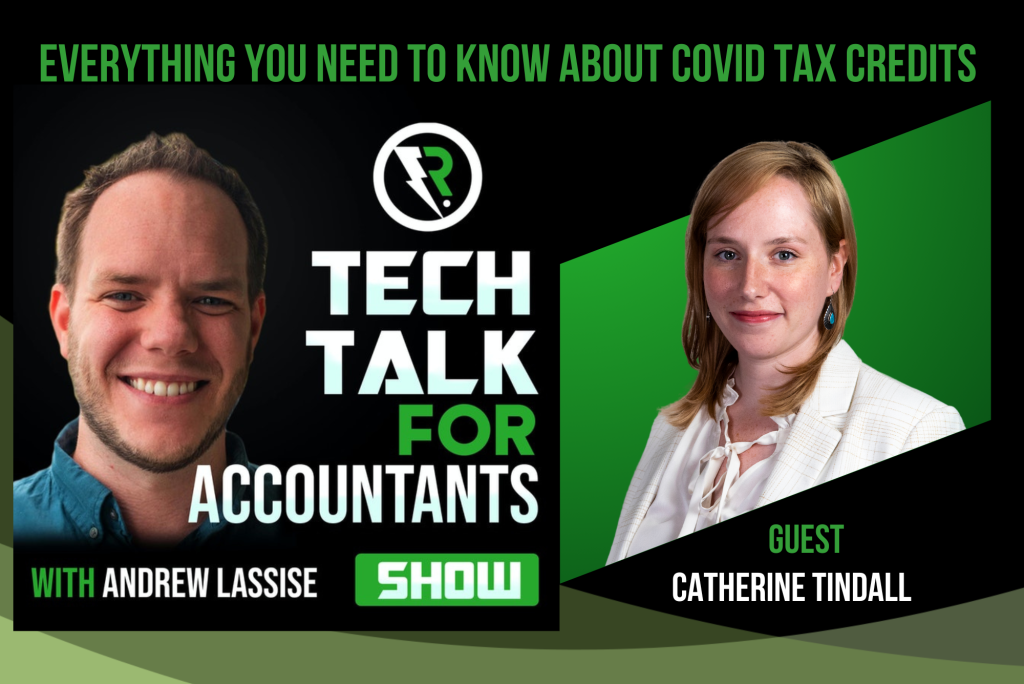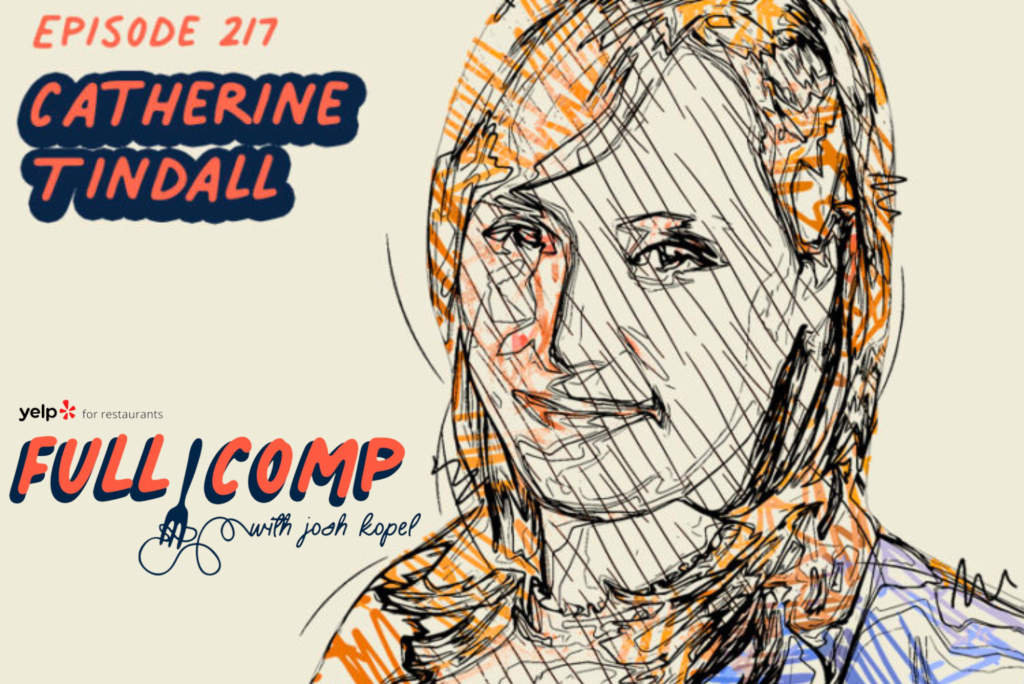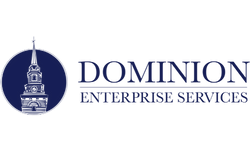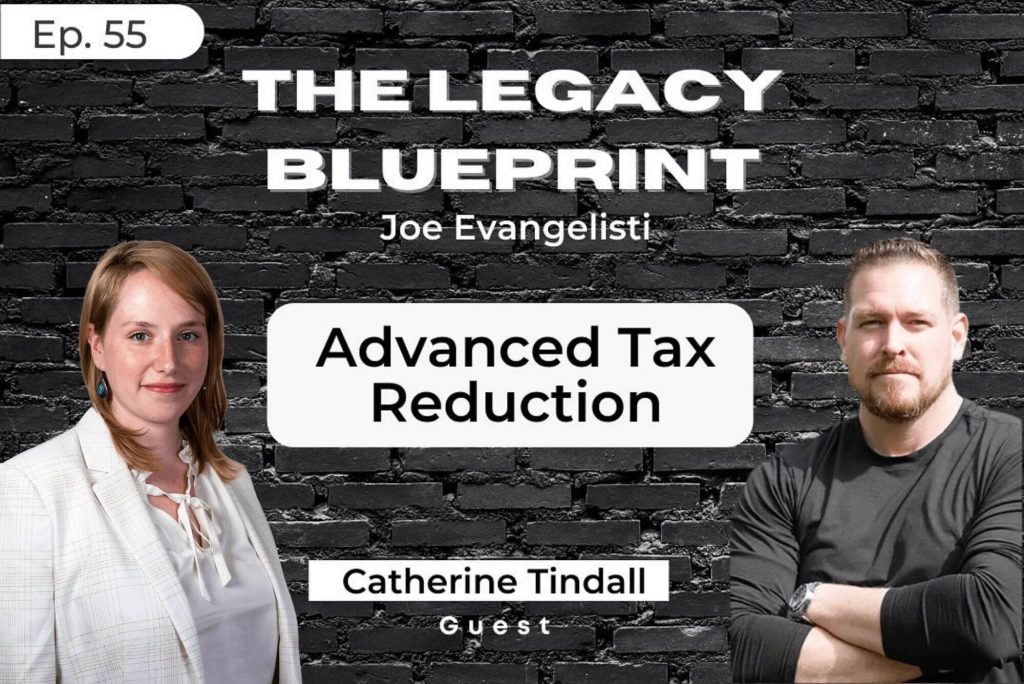
Advanced Tax Reduction w/ Catherine Tindall
Joe and Catherine talk about what got her in the industry and the obstacles she faced during her journey in building the company, Dominion Enterprise Services. They discussed possible changes that might affect real estate investors, strategies and tips for those starting out on real estate and what it means to find a great tax professional to help you with your business.
Transcript
00: [Music][Applause]
00:13 [Joe Evangelisti]
Alright! So we’re joined here by Catherine Tindall today from Dominion Enterprise. I’m really excited to talk a little bit about you. Actually I really do get excited talking about tax benefits and figuring out how we can benefit our businesses and utilize money and better advantages. So welcome to the show today Catherine!
00:37 [Catherine Tindall]
Yeah thank you so much! Well, I have to admit that I get a little bit excited talking about taxes too.
00:44 [Joe]
So give us a little bit of an elevator pitch, your background maybe, what got you excited to get into taxes to begin with. Then we can really kind of get into the nitty-gritty about some fun stuff.
00:54 [Catherine]
Yeah sure, it’s kind of a roundabout story. A million years ago back when I was in school, I wanted to go into medicine because I had a really strong desire to have my work life be something that was helping people and serving people but then also building a legacy for myself and my family. I found as I got farther into that world that just kind of the modern state of things and how things were going just didn’t align with that the way I wanted to. It’s funny how it was an offhand suggestion from my parents who are both CPA’s to take an accounting course. Long story short I’m here talking about taxes. But I found it’s a really unique opportunity in the industry just because there’s so much fear around taxation and there’s so much confusion. It really does give me an opportunity to both help people and educate people. Also help them build their legacies and really do something that’s substantial and impactful for them. Because you know, I’m sure as you’ve experienced tax is something that’s become a major problem the more enterprising and entrepreneurial you get.
02:15 [Joe]
So what you’re saying is it’s in your DNA, right? You couldn’t fight it?
02:19 [Catherine]
Yeah, I guess I couldn’t escape it. It was like my fate.
02:23 [Joe]
Nice! Now that you mentioned it, I mean without getting too political. Things are changing, right? The taxation climate. And I know that you have a big focus on real estate investors, a lot of our listeners are in that space in some way shape or form. What do you see as the top couple things that might be affecting us, as real estate investors here in the near future?
02:44 [Catherine]
I think most real estate investors that I talk to, part of the reason why they get into the space in the first place is because it is so tax advantaged. It’s one of the few areas and few lines of business where you really have a lot of control with how you’re taxed because you have control over when you execute deals. And then there’s just a lot of benefits in the tax code for people involved in real estate because you’re able to generate a positive cash flow a lot of the time without triggering a tax bill. If you can time things correctly. So I think with the recent legislation. We still don’t have finalized legislation as of the time we’re recording this but the main thing to take away is a lot of the areas that the new administration is interested in that maybe didn’t make it into the tax bill are areas that they’re going to be considering over the next couple decades. Because a lot of the things we’re seeing now, were things that kind of started brewing under the Obama administration. A lot of these little thought patterns are gonna stay on, certain things like increasing the capital gains tax rate, changing around the net investment income tax. Really starting to target people who are in the higher higher income buckets and starting to go after some of these more tax advantaged deals that people have been able to do. One of the things that’s really common is the 1031 exchange was something that’s almost on the chopping block. That’s a really common useful tool for people in real estate. It’s just good to know that some of these things, they’re being looked at and under scrutiny. Not that there’s any big big changes I see for the kind of your average person involved in real estate for this year. But it’s one of those things where you’re going to have to be proactive about it and have a strategy around some of these things. Because eventually as spending programs are expanded, we see more credits going out to different people and there’s more government spending going on that’s going to have to be paid for somewhere and nobody gets re-elected by, you know? It’s much easier to get reelected when your pitch is that you’re going to be taxing higher earning people. And so for a lot of people in real estate, they’ll end up getting kind of swept up in that. So those are the areas of concern.
05:06 [Joe]
Yeah, I don’t disagree. And a lot of it is talk for a purpose to the point that we have to pay attention to it and we have to start to voice our opinions as well, to continue to protect those rights. Because it is gonna potentially have sweeping changes to our fellow investors in our industry if that stuff changes. Can you imagine that 1031 going away? Can you imagine what that alone would do to real estate investors?
05:34 [Catherine]
Yeah, no. Some of the moves that was a common one, a lot of people have this as a strategy is if you own property when you pass away that property instead of its tax basis being at what you bought it for, it gets a step up so it goes to fair market value and that’s a way for you to be able to pass on. If you plan things correctly you pass on property without triggering a capital gains tax to your next of kin who inherit it. Estate taxes are a completely other ballpark but at least that part of it. A lot of people rely on that strategy to say, hey we’ve got a couple family properties that I want to go to my kids and I’m expecting when I pass that they’re going to you know. If you’ve had a piece of property in the family for forever that could be a significant issue, if that step up in basis goes away. That’s another one they were considering putting on the chopping block. It’s a lot of aggressive changes that are being considered. It’ll be interesting to see what actually happens because for the most part there’s a lot of backlash against doing big changes like that. But the policymakers have these ideas and they’ll keep coming back to the same places very often. It’s just all politics, a lot of it is. People want to make sure that they can continue to secure their seats and get re-elected, so you go after the smallest bucket of people with what’s considered an inordinate amount of wealth. Those people are going to get attacked because that’s just where it’s easier for them to be able to get reelected.
07:22 [Joe]
It’s only inordinate until it’s not, right? Changes like that could literally wipe out certain families. If the house was bought 50 years ago and now it’s worth millions and millions of dollars. All of a sudden that step up could completely eradicate.. that inheritance could change the entire future for that family. Some people don’t know how to handle that type of money or that type of tax bill or that type of burden. It’s just a different type of animal.
07:50 But I’m going to take it back a second, we do have a lot of newer real estate investors
and agents. What are some of those little ticks, maybe a couple takeaways that are impactful when you’re just getting started? That you learn too late in the game.
08:38 [Catherine]
What I see most people make most mistakes on when they come to me is waiting too late to have a plan for tax exposure or accounting. When you’re so caught up in the day-to-day of trying to get the work done, trying to get the deals done, trying to get financing, all of the moving pieces and all of the back and forth. not taking a step back at the beginning and saying okay what’s my wealth building strategy here? How do I want to execute it? and then knowing the full ramifications of the decisions you’re making. For a lot of people, they just kind of okay tax will deal with that at the end. Instead of going into deals and realizing what the full ramifications are of things you can do. A common place where a lot of people get started and I see it’s a great opportunity like with the fix and flip thing is to take advantage of special gain exclusion that you have on your personal residence. So if you buy a property, you can live in it for a couple years while you’re improving it. When you then go to sell it you can take advantage of this gain exclusion and it’s up to 500,000 for a married filing joint couple. If you’re just dipping your toes into stuff and you’re not sure you’re going to really make it on a deal and you have some time, maybe have a w-2 job that you’re doing. You’re just kind of slowly starting to play with things and transition. That’s where you can really get a big tax benefit. Basically you pay no capital gains tax up to 500 000 on that. That’s a good place for people to start. I think in general, having a strategy when you go into it and knowing the full ramifications of things can be really helpful. It’s a step that I see a lot of people miss.
10:37 [Joe]
Yeah. I actually love that strategy. I drive my wife nuts with that strategy. We move every two years, I think we’ve used it four times now. We joke because I’ve been in this house for four years and I say we’ve been here, two years too long. We need to find somewhere to move. It’s funny you brought that up, I’ve actually almost forgotten about that strategy because I use it by default. I don’t think a lot of people understand that strategy. You use your primary residence you can improve it. Build your own house as a flip, move into it, refinance it out but when you sell it go ahead and take that gain. It’s tax-free up to 500k as long as you’re a married couple and 250k as a single. You could have 250k in profit and you don’t pay capital gains on that, which is huge! It’s a great stepping stone for somebody, especially the way interest rates are and mortgages are right now, you could use an FHA mortgage too. You’re into your own flip for very very little capital. And I’m pretty sure you could even do it with a 203K right? There’s no reason you can’t use all these leverage tools to do your own flip while you’re living in the house.
11:49 [Catherine]
Yep and especially if you’re just starting into it and you’re not looking to cash in on depreciation yet. Which that’s a separate, more advanced thing. It’s just a great way to get started with that and if you take a property with the mind of knowing, you’re going to do that you can basically do it every two years until you decide you’ve had enough. It’s really easy to leverage those and it’s just one of those things where, if there’s a strategy there, you can keep compounding it and keep going after it. That’s part of the mindset shift with that.
12:31 [Joe]
I think the other thing I love about that particular strategy is you can be a core real estate investor without being a real estate investor. You could have a full-time job and do that. You can go renovate a house, move in, live there for two years. Do it again. That’s another thing that I don’t see enough people taking advantage of that opportunity, especially people who have the bandwidth to deal with that type of thing. They’re already renovating their houses, moving in. They like doing that type of work. They like dealing with general contractors, why not do that and then do it again. I mean beside the fact that it’s a pain in the butt, to move every two years. I have 500 of those Rubbermaid containers in my basement. I just pack it all up and put it in and I’m out.
13:12
I love that, any other tips and tricks for newbies?
13:20 [Catherine]
I’d say the biggest tip that I have is before you get started doing things, take another second once you’ve figured out what your general strategy is, almost like a business plan for it. Take a minute and figure out how you’re going to do accounting before you start doing all your transactions and everything.
13:40 I really recommend people to do a little exploration and find an automated way to take care of that. A very common one that I see people use is QuickBooks online. The nice thing with programs like that is once you get used to segregating out all your business expenses into a separate bank account. It doesn’t necessarily have to be a business bank account but just a separate bank account, that’s all your real estate activity. And then connecting that to a tool that’s going to have automated bank feeds like QuickBooks online, other popular ones called Xero or just using an outside bookkeeper or something like that. Do that before you start doing everything. So by the time it gets to the end of the year, you’re not stuck with a shoe box you’re trying to cobble into some kind of records for an accountant to deal with. Because then as you’re going through the year once you have all those automated things going, you’re getting profit and loss statements automated. You’re able to have more insight into what’s going on in your business and more timely information. That’s going to be more helpful for you to be able to make decisions with. Because I see a lot of people they lean on how much cash is in the bank is how they’re doing, versus having a good sense of understanding, some financial statements understanding some more of those metrics to really know how they’re doing. I think that’s another good tip to start with. I see a lot of people just there’s so much little stuff that they’re trying to handle every day. They’re like oh I’ll just deal with it at the end of the year. That’s not a good mindset to have with it
15:14 [Joe]
First of all that’s a huge tip and it’s so impactful. I coach a ton of business owners and I see this happen. I did this for a long time so I’m one of them. So many people, especially starting out in business, they run their life out of their personal checking account. Even if you have a business checking account, what happens is I take the money I put in my business checking account when they need it and then all my mortgage is due, let me take it back and pay my mortgage. And then oh, I have money I’ll put it back in the account. Running it back and forth and there’s absolutely no differentiating factor between the two accounts. You might as well just have one account, right? Yeah, so having that separation is massive. It also creates a peace of mind that you’re running a real business and the business is here and my personal is here. I also really recommend that you pay yourself with just a systematic automatic payment scale, even if you don’t believe you can. Just a little bit of money that way you start to create that process of I’m an actual employee of my own business and I’m separate from it. So that I can start to create that peace of mind and that gap. You’re right on having that separation between your personal and your business life. There’s so many different benefits aside from just the financial benefits that you mentioned and keeping yourself on track. And so that you don’t have to chase and figure out, what did each project cost me? What was my P and L? People run around and they go, oh I flipped the house and I made sixty five thousand dollars. Then you’re like, what was your actual? And then, yeah I only really made 18. Well stop lying to yourself because I have the books. I think that’s a great takeaway
16:50 [Catherine]
Yeah, and when you have those ready numbers before you get to the end of the year too, you can consider. Like okay I didn’t make 65, I made 18. What’s the tax exposure for that? Is this going to be at my ordinary rates? Is this going to be at capital gains rates? That can be the difference between 15 and 40 percent and that’s a huge split on what your take home is going to be. Unless you have timely information during the year, you’re not going to know how that shook out. That’s part of it as well.
17:25 [Joe]
Tell me about the business a little bit. Dominion Enterprise Services, when you were building this business up, you had to have some obstacles, some roadblocks, some pitfalls challenges. Can you take me back to a time where you might have felt like, man this being an entrepreneur thing. Maybe I’ll just go find a nine to five I could work for another CPA firm. I don’t know if I want to do this.
17:48 [Catherine]
Well I think for me the biggest obstacle I found was when I was working at other CPA firms, I kept encountering things that felt broken to me. A lot of the client interactions and relationships, I just found a lot of pieces that I wanted to make better. So when I founded this firm a lot of what was the obstacle and effort at the beginning, was how do I engineer this thing? Kind of its DNA to fix these problems. To prevent fires instead we’re going to put out fires and do this sustainably and have this fixed. Because there’s a lot of people leaving my profession. I think there’s a statistic I read a couple weeks ago, the main body that organizes us is called the AICPA and I think 75 percent of members were eligible for retirement last year. There’s a major deficit of people in the tax base and I just see that getting worse and worse every year. I think part of it’s just because the CPA firm model’s really broken. When you have a lot of deliverables all due on a couple of tax deadlines during the year that just causes a lot of intense burnout. I think the biggest obstacle for us at the beginning is definitely, How do you take a business model that feels broken and fix it. Because the work that we do really does help people and it’s work that’s really needed and yet a lot of the staff and partners burn out so quickly. It’s almost like the same thing with medical you, there’s just so much demand and there’s not enough supply. So people just get really burnt out unless you can establish good systems. We rely a lot on technology in my practice and it’s all those things and that kind of re-engineering where the stress points are and the pressure points are, is what makes it work.
19:53 [Joe]
And I tell you again, I can’t say this enough. I don’t want to get political but you relate it to the healthcare space. Why are doctors getting burned out? It’s because the insurance industry is putting more pressure on them and making it more difficult to do their job. Why are CPA’s getting burned out? Well now they want to quadruple the size of the IRS and make it more and more difficult to do your job. Well it’s a very good analogy, right? I mean, it’s like how can you guys be expected to continue to do it? You’re telling me 75% of people are eligible to retire and if things get more and more difficult as they’re going over the course, the next couple of years. Well I’m going to retire. I’m out of here.
20:31 So you can’t expect these professionals to step up and get better and better. Thank God for people like yourself.
20:42 [Catherine]
Yeah, and it’s just the nature of it because I think a lot of people don’t realize. In the US our tax code is designed to do two things. It administers a lot of social programs and incentive programs to try to get people to behave a certain way. The secondary function of it is to collect revenue. And because it’s a combination of those things, it’s really complicated. Any time the government wants to do something to incentivize people to behave a certain way, they mess with the tax code. And yet the whole compliance burden of that falls on taxpayers to handle it themselves. Especially when you have people in real estate where they’ve got a complex way of earning income. It just makes it even more complicated for them. So I was looking at a statistic the other week that the number of pages in the tax code back in 1950 was like 10,000 pages in 1950. As of 2010 the tax code and like relevant court citations that we need it was up to 70 000. [laugh]
21:45 And before 1950, like in 1930 it was maybe four or five thousand. So you can see the complexity, it just balloons over time.
21:57 [Joe]
Yeah, and so how are you expected to memorize 70 000 pages of tax credit? You’re supposed to understand and sort your way through that and advise your clients on 70 000 pages of tax code, right? Essentially.
22:10 [Catherine]
Yeah, that’s why I think it’s important to rely a lot on technology in my profession. Then a big part of it is, people have certain specialties. You just have to niche down into areas that are your specialty focus. Like for us it’s really tax planning work and focus with a couple of key areas. Like people who are involved in real estate because that’s a very sub-niche area and business owners.
22:40 That’s our little space. because it’s such a big tax code.
22:46 [Joe]
You bring up a great point because we had this. We briefly touched on this right before I hit the record button. What do you think a lot of real estate investors are missing? Because I had listened, people reach out to me on a weekly basis on these types of items. I love my CPA because he’s a real estate investor. He owns multiple businesses. But I have people tell me all the time, I don’t think my CPA gets it. I don’t think they’re, I don’t think he or she is doing the right thing.
23:16 Why do you think people stay with their CPA for so long and don’t get the right advice? or just paralyzed to move forward and ask for the right advice?
23:27 [Catherine]
I think it’s because there’s so much confusion and frustration. Almost if you have these situations you can’t do it yourself. They just get into this mode, where they’ll either procrastinate with it because it’s such a pain to try to form a new relationship. It’s so hard for a non-technical person to evaluate if this technician is right or not. I think it’s the same thing with a lot of doctors too, where it’s hard for you to know if you’re getting the right advice. Because the only way for you to actually be qualified to know if you’re getting the right advice is if you were able to do it yourself. And for people that have complex transactions, you’re not really able to do that. Your best guess is, have a couple people look at it. A lot of times what people will do is they’ll try to price shop or something like that.
24:22 Your best bet for trying to find someone that’s going to be a good fit is someone who focuses on people who are like you. On top of that you can get a sense for if the person is really engaged with growing their practice. If they’re engaged with their local society of CPAs. If they’re excited when they talk to you or they just kind of like, okay well I can fit you in.
24:49 Those are red flags for me when I talk to people. Okay, so what isn’t working with your previous relationship because I want to know. Are you just a bad egg? Or are you dealing with a bad tax professional? And usually the whistles that go off are, they never have time for me. It takes them a month to get back to me. If I send them an email, I never hear back from them. I call and have a 15-minute conversation that I don’t get any answers on and then I get a bill in the mail. Kind of that unsatisfied feeling. I think for a lot of people, they’ll just hang on because you just don’t know how to find the next person. Or who’s gonna be a good fit for what you have going on? Because it’s so hard to qualify that kind of professional.
25:40 [Joe]
Yeah, it definitely makes sense and I’m not just saying this because you’re on there but you’re here on the podcast. I think that if you’re a listener and you’re paying attention to this. If you’re not getting the proper tax advice, you obviously should be looking for somebody else to call, to talk to, everything Catherine just said. Just interview some other people, talk to them and ask them their opinion, for most. They might even review your last tax return just to see if there’s some holes in it, right? Some gaps that they might be able to change going forward. I think that there’s far too many people, especially as they start to build their business. You can correct me from wrong but they start out with one or two properties next thing you know they’re up to 20 or 30. And their accountant is just not positioned to handle that type of investor. When you have one or two properties, it’s fine I can handle that type of return. Now you’re a real legit business and I’m just not a real estate investor CPA. I see that happen quite a bit so I think it’s really important that you find a CPA that’s versed in real estate investing at a high level if you’re starting to grow and you know what the end game is.
26:52 [Catherine]
I think for a lot of people too, they go from that kind of beginner stage to that more intermediate stage and the conversation quickly changes from, okay I need to have my taxes done at the end of the year to how can I actually be taking advantage of everything and making sure that we’re reducing how much we pay. That’s the kind of work that we focus on in our firm. It’s more of a proactive relationship and how can we actually engineer what you’re doing to get you the best tax advantages, by taking advantage of stuff like cost segregation studies or 1031 exchanges or gifting strategies with family members. And actually modifying what’s going on so that you’re paying less in tax. And then having all the compliance work like all the tax returns and all that stuff match up with these strategies to try to reduce what you’re paying.
27:45 [Joe]
Yeah and not only that. How do I make sure I stay bankable, keep my taxes low, keep my returns where the banks don’t think well, you made negative money last year, how can I loan you money? People don’t think about these things until it’s too late and unfortunately, you file a tax return and you need a loan a year later. And they’re saying what happened last year right and then you have to backtrack or backpedal. So a lot of those things that again your CPA is almost like an insurance policy into your future when you’re starting to try to grow they need to understand the roads that you’re on to help you get there as well. So yeah!
28:19 Tons and tons of great points. Catherine, what did I forget to ask that I probably should have asked you today?
28:25 [Catherine]
Maybe just how to get in touch with us? [laughs]
28:28 [Joe]
Yeah all right great! Let’s do that. What’s the best way for our folks to contact you?
28:33 [Catherine]
Best way to get updates on just different things that are going on in the tax code is if you’re on LinkedIn to connect with me on LinkedIn or my company, Dominion. And on top of that on our website we post regular updates on different legislative changes, different tax saving ideas. Then from time to time we’ll post different educational videos and those sorts of things that people tend to find useful. So those are the best ways to get connected and obviously we’re able to work with any clients in the US and we have a specialty with the tax planning and proactive kind of work. You can visit our website and there’s a contact form, if you’re interested in having a second set of eyes on your situation.
29:18 [Joe]
Fantastic! Well, that was an excellent interview. I think you gave our listeners a ton of advice and a ton of ideas there to move forward, hopefully. If any of them have any um issues with their current practice or they don’t have a CPA. Guys if you don’t have a CPA looking at your stuff and you’re trying to get into real estate or you’re in real estate right now, absolutely have somebody take a look and have a conversation. Reach out to Catherine. You know where to find her, we’ll put everything in the show notes.
29:42 Catherine Tindall thanks for being on the show today. I appreciate it.
29:45 [Catherine]
Yes thank you so much, Joe this was an absolute pleasure.
29:47 Absolutely, talk soon!
29:50 Thank you!
Maybe You Like
FAQs About The California Employee Retention Credit
ERC For Restaurants: 5 Things Restaurant Owners Should Know
COVID Tax Credits – Catherine Tindall, CPA
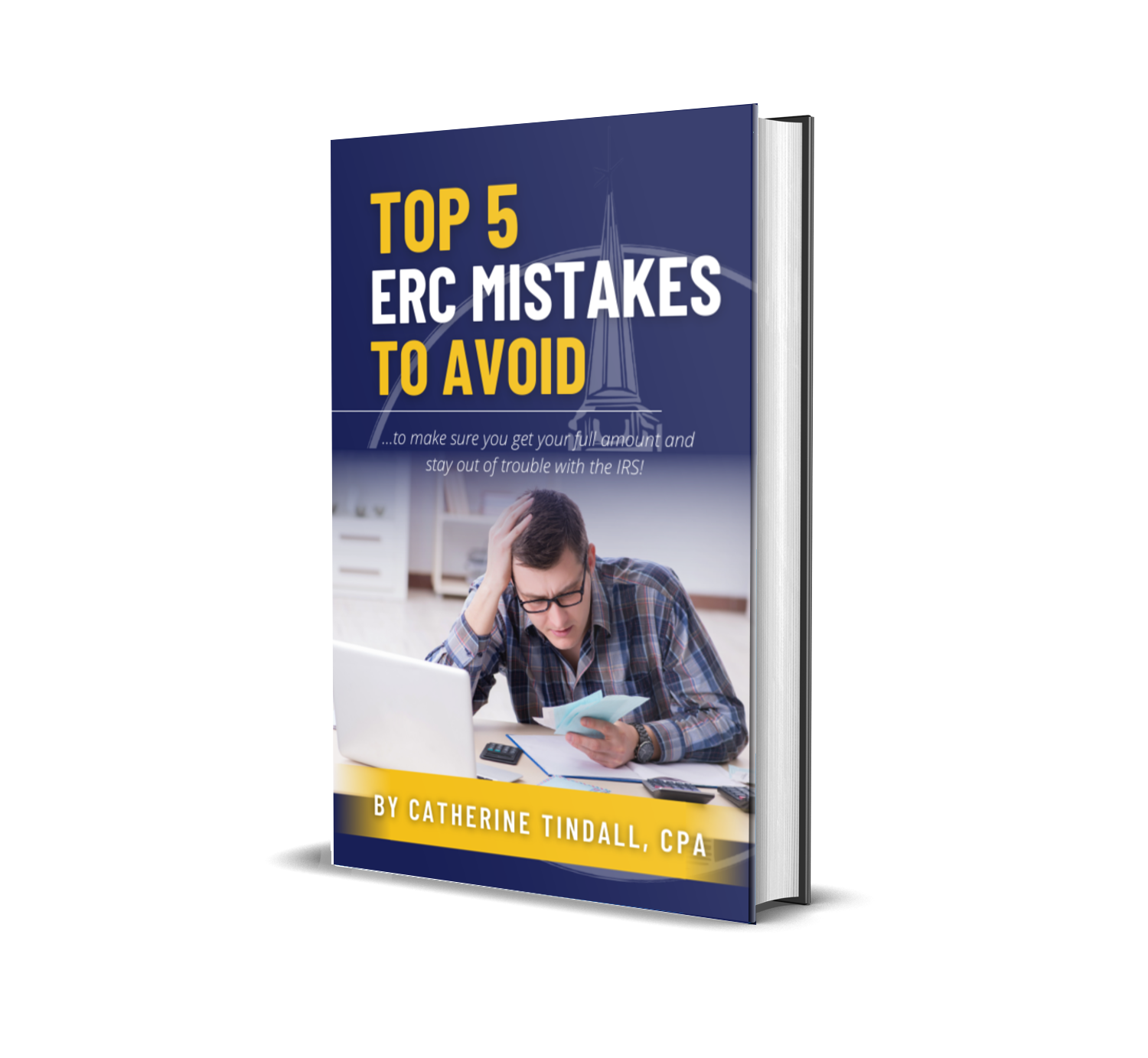
Don’t be the next victim of ERC mistakes!!
If you want to learn more about the credit and the process for claiming it, be sure to check out our short e-book that goes through the top five mistakes we see time and time again in the restaurant and other industries when it comes to the ERC



